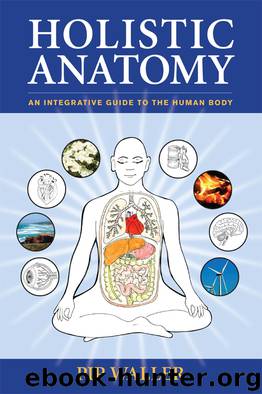Holistic Anatomy by Pip Waller

Author:Pip Waller [Waller, Pip]
Language: eng
Format: epub
ISBN: 978-1-58394-589-6
Publisher: North Atlantic Books
Published: 2012-05-28T16:00:00+00:00
Dehydration, Diuretics, and Drinking Lots of Water
There are interesting and contradictory theories about water and how much we need. It is common for holistic nutritional therapists to say that most of us are dehydrated—we don’t drink enough, and what we do drink is dehydrating. For example, caffeine-containing drinks like tea and coffee are diuretic and make the body lose water; they also are experienced as toxins that need to be excreted, therefore needing extra water to clear them from the body. Alcohol and sugar drinks cause a similar reaction.
Then there are the toxic strains of modern life to contend with: air pollution, food additives, contaminants like pesticides, drugs, nicotine, specific foods experienced as toxins (like wheat or dairy), electromagnetic pollution, and stress hormones. In order to excrete any toxin, the body uses water—remember, nothing moves in the body without it. The idea is that many people are toxic to some degree or other and are therefore in need of water.
Varying amounts are given for needed daily water intake. We’ve all heard of the proverbial eight glasses a day—that could be a bit of a myth. My nutritional therapist tells me that it’s best to drink eight pints of water every day in order to restore the body to full hydration. Try it yourself—though it requires many trips to the bathroom, some people do feel benefit from that high intake very quickly. (Note: If you have kidney disease, this much water would be harmful, and some epileptics seem to get more fits if they drink lots of water, so this is not for everyone.) Try taking one or two pints, room temperature, as soon as you rise in the morning. Considering that at night your body can lose up to 1 1/2 pints of water through breathing and sweating, this is a reasonable idea.*
When the body is dehydrated, it may do all kinds of things to try and set things straight. Sometimes it panics and tries to hold onto water, leading to symptoms such as edema (excess water in the tissue spaces, especially seen as swollen ankles or a swollen sacrum after lying down) and high blood pressure. (If the body holds on to water and it thus increases in the tissue spaces, the blood vessels may take on more water. An increased blood volume can cause high blood pressure.) The orthodox treatment for these conditions will be diuretics—drugs that take water from the cells and force the kidneys to excrete it. Of course, if the problem is actually caused by dehydration this treatment will make the situation worse. Actually, a better treatment could be to start drinking more water. Two side effects of diuretics are dizziness and drowsiness. These are actually caused by the brain being dehydrated, causing the cells to shrink. This can cause confusion that makes a person forget to drink or eat, exacerbating the problem and potentially even leading to death, especially among older people who may be isolated and have no one to keep an eye
Download
This site does not store any files on its server. We only index and link to content provided by other sites. Please contact the content providers to delete copyright contents if any and email us, we'll remove relevant links or contents immediately.
| Administration & Medicine Economics | Allied Health Professions |
| Basic Sciences | Dentistry |
| History | Medical Informatics |
| Medicine | Nursing |
| Pharmacology | Psychology |
| Research | Veterinary Medicine |
Tuesdays with Morrie by Mitch Albom(4788)
Yoga Anatomy by Kaminoff Leslie(4364)
Science and Development of Muscle Hypertrophy by Brad Schoenfeld(4136)
Bodyweight Strength Training: 12 Weeks to Build Muscle and Burn Fat by Jay Cardiello(3973)
Introduction to Kinesiology by Shirl J. Hoffman(3776)
How Music Works by David Byrne(3272)
Sapiens and Homo Deus by Yuval Noah Harari(3078)
The Plant Paradox by Dr. Steven R. Gundry M.D(2627)
Churchill by Paul Johnson(2587)
Insomniac City by Bill Hayes(2560)
Coroner's Journal by Louis Cataldie(2482)
The Chimp Paradox by Peters Dr Steve(2388)
Hashimoto's Protocol by Izabella Wentz PharmD(2378)
The Universe Inside You by Brian Clegg(2136)
Don't Look Behind You by Lois Duncan(2133)
The Immune System Recovery Plan by Susan Blum(2059)
Endure by Alex Hutchinson(2029)
The Hot Zone by Richard Preston(2020)
Woman: An Intimate Geography by Natalie Angier(1942)
